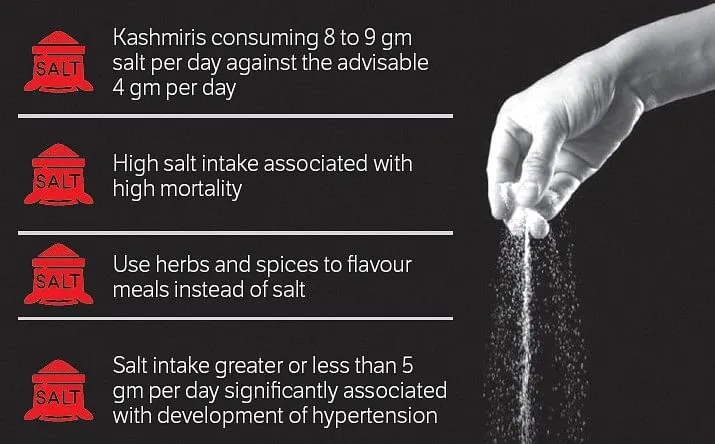Srinagar: High salt consumption has become a major health concern in Jammu and Kashmir with many people consuming more than the recommended daily intake.
According to experts, the high salt intake could lead to health complications like heart failure, high blood pressure, stroke, kidney disease, and even gastric carcinoma.
Renowned health expert Dr Showkat Shah told Greater Kashmir that people should consume 4 gm salt per day, but in Kashmir the salt intake was 8 to 9 gm per day, which is not good for health.
“We usually use table salt while eating. There are two types of salt intake, one is visible and another is invisible like peanuts, pistachios, butter, potato chips, and Kashmiri bread which contain double salt,” he said.
Dr Shah said that the high intake of salt was associated with high mortality.
“The best way to cut salt intake should be gradual. People should opt for salt substitutes like vinegar, onion, and lemon. People should always check the label of salt before buying food products from provision stores,” he said.
Talking to Greater Kashmir, public health expert, Dr Sheikh Saleem, who is also working with Ministry of Health, GoI, said that there were several reasons for the high salt consumption in J&K like the traditional Kashmiri cuisines with high salt content and Kashmiri Nun Chai, the pink salt tea.
“Processed and packaged foods, whose use has become more widespread in recent years, often contain high levels of salt. Traditional Kashmiri Nun Chai adds to the burden,” he said.
Dr Saleem said that to address the issue of high salt consumption, there were several recommendations like education campaigns to raise awareness about the health risks of consuming too much salt and to promote healthy eating habits.
“Food manufacturers could be encouraged to reduce the amount of salt they use in their products. People can reduce their salt intake by choosing fresh, unprocessed foods, and using herbs and spices to flavour their meals instead of salt,” he said.
Dr Hamed Bashir, a cardiologist, told Greater Kashmir that high salt intake was not good for the heart health as well.
He said dietary guidelines for Americans recommends adults to limit sodium intake to less than 2300 mg per day, which is equal to about 1 teaspoon of table salt.
“For children under age 14, recommended limits are even lower. But in Kashmir people do not have a healthy dietary habit,” Dr Bashir said.
Several studies revealed that the mean salt intake among the Indian including J&K population ranges between 5.22 and 42.30 gm per day.
Moreover, among other risk factors analysed, salt intake greater or less than 5 gm per day was significantly associated with the development of hypertension.
According to the studies, salt consumption is high in the country although this assessment had been done primarily by subjective methods in India.
The studies reveal that people all across are recommended the same cut-off value of dietary salt consumption regardless of the diversity in dietary patterns and environmental conditions across the country.
The studies suggested that there was an urgent need to address these issues through evidence-based population research.
A newly published report by the World Health Organisation (WHO) has stressed that salt consumption, no matter how flavoured it might make the dish, must be limited to just 5 gm a day.
This is the equivalent of about a teaspoon daily, and would help significantly reduce the burden of non-communicable diseases caused by excess sodium consumption.






